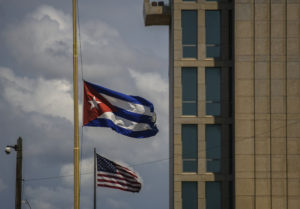Washington, D.C.— Today, the Cuban government will officially open an embassy on United States soil for the first time since 1961, a key step in updating U.S.-Cuba relations for the 21st century.
“In addition to serving as an important symbolic step in the process of normalizing relations, the exchange of embassies will provide an important platform for both countries to engage in serious discussions, including direct talks on human rights,” said Marc Hanson, a senior associate at the Washington Office on Latin America (WOLA).
On the same day as the embassy’s opening, U.S. representatives will also announce a Republican-led, bipartisan bill that will create new opportunities for U.S. telecommunications and Internet firms to offer services in Cuba and build a 21st century digital infrastructure.
The Cuba Digital and Telecommunications Advancement Act (Cuba DATA Act, or H.R. 3055), introduced by Rep. Kevin Cramer (R-ND) and Rep. Peter Welch (D-VT), seeks to help Cubans connect to each other and to the rest of the world. The legislation will accelerate the normalization process by helping Cuban individuals and businesses access the tools needed in today’s digital age.
“Just as exchanging embassies will help the U.S. revise its outdated approach towards Cuba for today’s diplomatic realities, expanding internet and telecommunications services will give Cuban citizens more access to information and more economic opportunities,” said WOLA Program Director Geoff Thale. “Internet access has become a pillar of the 21st century global economy, and this bill brings new possibilities for both trade and people-to-people engagement.”
The sponsors of the Cuba DATA Act also envision the bill as a potential boon to U.S. firms looking to do business with Cuba’s emerging private sector. “Not only would our telecommunications companies have the opportunity to upgrade Cuba’s infrastructure, but our farmers and entrepreneurs would be able to conduct business in Cuba utilizing 21st century communication methods,” said Representative Cramer.
The opening of embassies and the introduction of the Cuba Data Act come amidst growing support among Republican and Democratic lawmakers alike for updating U.S.-Cuba relations. The legislation mirrors a similar bill previously presented in the Senate, also introduced by bipartisan group of sponsors.
“Increasingly, politicians in both parties are aligning themselves with the American people and their desire for improved U.S. – Cuba relations. The DATA Act repeals outdated policies that restrict American investment in Cuba and is another example that support for updating U.S. policy towards Cuba is growing in Congress. The momentum to lift the embargo on Cuba is picking up steam as Congress heads into the August recess,” said Hanson. Hanson recently led a people-to-people delegation to the island, and described his encounter with emerging online entrepreneurship in Cuba here.
U.S. public support for normalization is evident in poll numbers, which show that nearly two-thirds of Americans favor establishing diplomatic relations with Cuba. A clear illustration of this came on July 9, when a diverse set of organizations including the United States Chamber of Commerce, the Church World Service, the U.S. Agriculture Coalition for Cuba, WOLA, and over 28 other human rights organizations, business, trade associations, and faith groups issued a joint statement urging Congress to support funding for a U.S. embassy in Cuba.
###
Contact:
Kristel Muciño
Director of Communications, WOLA
press@wola.org
+ 1 (202) 797-2171



